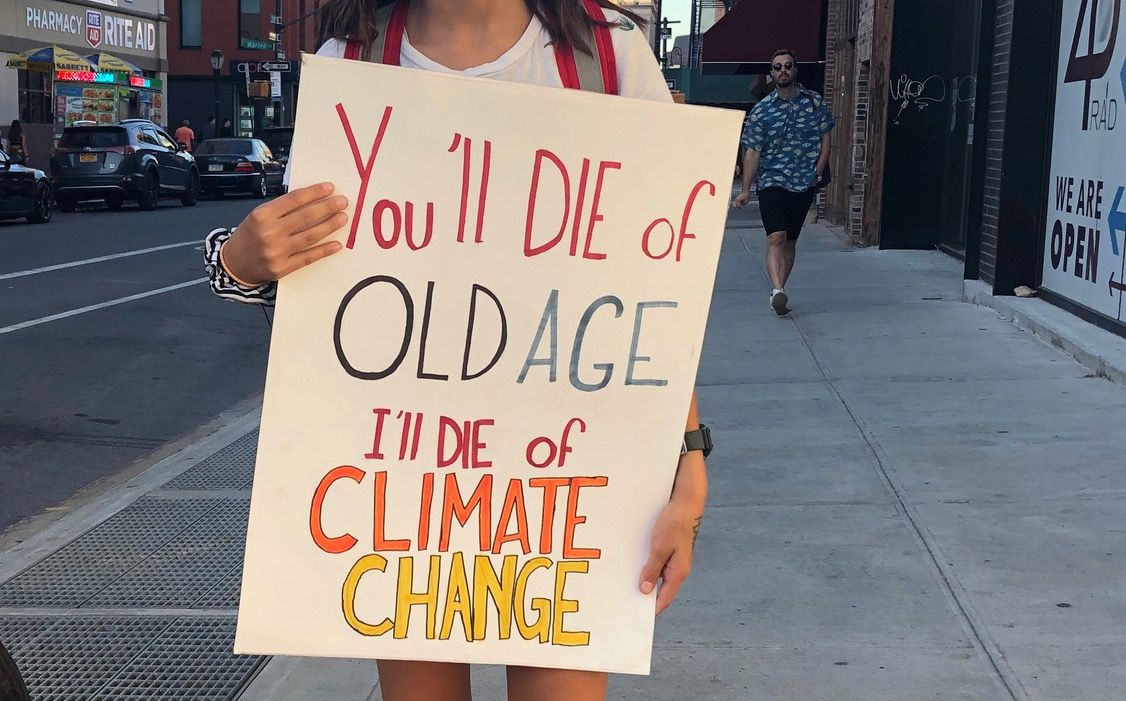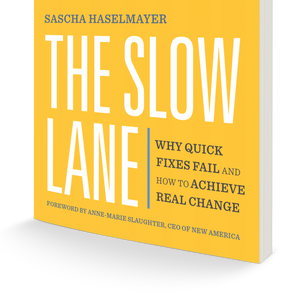My wonderful editor Steve Piersanti calls the Slow Lane a ‘fractal’ concept. By that, he means that it plays out in similar ways at different scales, from the intimate to the global. And it is true: I have seen how the Slow Lane can also inspire inner work. As a parent, it helped me unravel my theater of listening when the stakes couldn't be higher: at home, with my daughters. The Slow Lane can inspire us not just to find more caring ways to support people who do social change, but can change the way we relate to our loved ones and our family.
Overwhelmed By Uncertainty, Parents Take Charge
What inspired me to think about the lessons the Slow Lane holds for me as a parent, was seeing a beautiful dinner party, among friends, unravel when our daughters talked about Fridays for Future. Put on the spot by, my dear friend Georg, himself a truly wonderful parent, couldn’t help himself but rush to restore order. Instead of celebrating the moment when our children tried to find their agency to influence a future firmly controlled by forces beyond them, he himself tried to win back control of the conversation by attacking Fridays for Future.

I may have felt that I don’t have any real answers to the threat climate change poses to our children. But at the same time, as a father, I am supposed to protect them, know all the answers.
More than a year later, he explained what happened: “Maybe there was also something else that caused me to react the way I did. I can’t quite put my finger on it. I think I felt a bit overwhelmed, put on the spot. Vulnerable. It was a terrible feeling. I may have felt that I don’t have any real answers to the threat climate change poses to our children. But at the same time, as a father, I am supposed to protect them, know all the answers.” Georg didn't lay into the movement to harm the children, but to live up to his expectation of what it means to be a good father. Put on the spot, he didn't know what else to do to protect them from climate change. What overwhelmed him was coming to terms with that he, too, was powerless. And that's what any parent feels when it comes to the future of their children. Taking charge gives us a misleading sense of control, it provides a moment of relief but no real solution.
Ask The One Question That Matters
This experience helped me see my relationship to my daughters in a new light. I couldn't help but think about how User Voice seemed to have done a better job at organizing listening, slowing down an overcrowded and violent prison to organize the kind of caring listening that my friend Georg couldn't. I asked myself, “Am I the prison governor in their young lives? And if I am, have I come around to truly listening to them, like Kevin Reilly, the governor did in Pentonville Prison?” Inspired by User Voice, I began to question my questions. And what I learned is just how easy it was, every day, to disguise my fears and needs for control and domination as acts of listening.
Parenting in the Slow Lane comes down to this: Do you trust your children to know what is right, or do you believe that you are superior in your vision or ability to make that judgement?
The deeper I worked myself into the question of parenting, the more I found that it came down to a question right at the heart of the Slow Lane: Do you trust your children to know what is right, or do you believe that you are superior in your vision, or ability to make that judgement? My advice is that if you believe, rationally, that your children have a contribution to make, trust them. I noticed how I had been cheating myself for years, making myself believe that I was listening to my daughters when really I was being judgmental, or passive-aggressive. My teenage kids, of course, saw right through it and rolled their eyes every time.
Now That You See, Don't Be Afraid
At one point, I looked at myself, questioning my justifications for being the benevolent dictator in their lives. This was the first step to facing my fears. What was I so afraid of? It helped me get to the bottom of the simple question: Do I really want to empower my children? And if I do, is there any better way than showing them my unconditional trust?
I began to change my ways, replacing the pretense with actual trust. With time, my daughters began to open up. Three years later, I asked them if they had noticed the change. Sofía said, “Yes, you became more open. These days, when you ask, I know it is an invitation more than a trick question. I can be honest in my reply. And it made all of us a bit more independent.” When it came to our move to Berlin from New York, for example, she felt included and that we took decisions together. Her perception here was radically different from how things played out just six years earlier, when we moved to New York from Barcelona. Olivia saw a similar change, feeling less worried about having to say what I wanted to hear. Naturally, this is not a quick recipe for perfection. After all, I still continue to unlearn. Olivia remains acutely aware of moments when she can still sense that she is being manipulated. She playfully calls those the ‘1984 Moments’ in our relationship, signalling that things have gotten a lot better.
It took courage to challenge myself as a parent, but it paid off. Try it. Ask yourself, for example, what your listening reveals about your true intentions. In my case, the Saturday question “What do you want to do today?” satisfied my need to feel that I am a good listener. In reality, the question was loaded with power dynamics and expectations of what good would look like, leaving them no choice but to roll their eyes. Learning from User Voice, I began to ask myself if this really was my intention. As parents, the Slow Lane can help challenge ourselves. After all, if it can be done in a dangerous prison, we can do it at home, right?
Don't Save Your Kids By Crushing Them
Talking to my friend Georg also revealed how, as parents, we store up all kinds of fears. I was grateful that he revealed his fears because it helped me face my own. These fears can push us to do the opposite of what we believe, deep down, to be right. This is when the Fast Lane takes over, giving into our fears by trying to take control and impose our answers. We tell ourselves, that if in doubt, we know best. Even if that means silencing the voice of those, whose lives are affected. Doing this, we are not just losing their contribution, but we will also crush their self-efficacy, their belief that they can make a difference. When has that ever worked for people, or for society?
Pretending to be in control when we aren’t will tear us, and our relationships, apart.
Observing and listening to Georg, learning from User Voice and other Slow Lane movements, and looking into my relationships, I found that I didn't have to be afraid to acknowledge these fears. We all have them. After all, the future is always uncertain. Pretending to be in control when we aren’t is what will tear us, and our relationships, apart. It happens at home, but also when global leaders faced the global financial crisis in 2007-2008. What the Slow Lane teaches us, is how to be upfront about these uncertainties, and use the crisis to build more trust, and share the agency with our children. Let them become a part of new, better answers.
Relationships Bigger Than The Sum Of Your Fears
The Slow Lane Parent does this, knowing that it will lead to more truthful relationships and better answers. It is also an investment in the self-efficacy of our children, their belief that they, too, can achieve real change.
The Slow Lane shows us how to be upfront about these uncertainties, extend more trust, and share the agency with our children, to become a part of our new answers.
The take-away for parents here is to not be afraid of what you might discover about yourself, your fears, and how you use your powers. Instead of focusing on problems, use the Slow Lane Principles as a way to nurture capabilities, and build healthier, more genuine relationships with your children.



